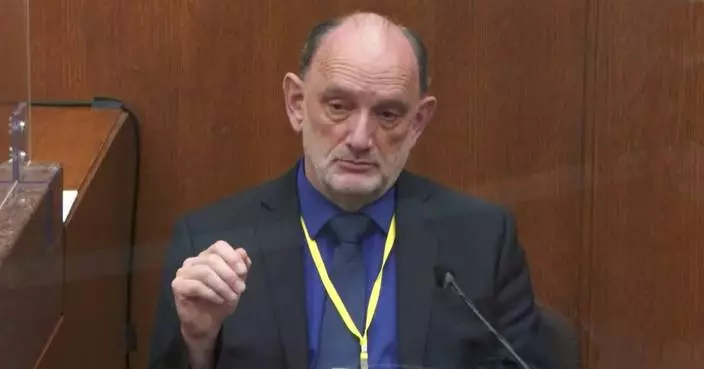MADRID (AP) — This time, Iga Swiatek had the answers against teenage sensation Alexandra Eala.
After a quarterfinal loss to the rising star from the Philippines last month in Miami, Swiatek rallied to a 4-6, 6-4, 6-2 victory in the second round of the Madrid Open on Thursday.
Click to Gallery
United States' Coco Gauff celebrates after her win over Ukraine's Dayana Yastremska at the Madrid Open tennis tournament in Madrid, Spain, Thursday, April 24, 2025. (AP Photo/Manu Fernandez)
United States' Coco Gauff celebrates after her win over Ukraine's Dayana Yastremska at the Madrid Open tennis tournament in Madrid, Spain, Thursday, April 24, 2025. (AP Photo/Manu Fernandez)
United States' Coco Gauff returns the ball against Ukraine's Dayana Yastremska during the Madrid Open tennis tournament in Madrid, Spain, Thursday, April 24, 2025. (AP Photo/Manu Fernandez)
United States' Coco Gauff reaches out to return the ball against Ukraine's Dayana Yastremska during the Madrid Open tennis tournament in Madrid, Spain, Thursday, April 24, 2025. (AP Photo/Manu Fernandez)
Poland's Iga Swiatek competes against Alexandra Eala of Philippines during the Madrid Open tennis tournament in Madrid, Spain, Thursday, April 24, 2025. (AP Photo/Manu Fernandez)
Alexandra Eala of Philippines runs for a ball during her match against Poland's Iga Swiatek during the Madrid Open tennis tournament in Madrid, Spain, Thursday, April 24, 2025. (AP Photo/Manu Fernandez)
Poland's Iga Swiatek returns the ball against Alexandra Eala of Philippines during the Madrid Open tennis tournament in Madrid, Spain, Thursday, April 24, 2025. (AP Photo/Manu Fernandez)
Poland's Iga Swiatek serves against Alexandra Eala of Philippines during the Madrid Open tennis tournament in Madrid, Spain, Thursday, April 24, 2025. (AP Photo/Manu Fernandez)
Poland's Iga Swiatek returns the ball against Alexandra Eala of Philippines during the Madrid Open tennis tournament in Madrid, Spain, Thursday, April 24, 2025. (AP Photo/Manu Fernandez)
Alexandra Eala of the Philippines celebrates a point during her match against Poland's Iga Swiatek during the Madrid Open tennis tournament in Madrid, Spain, Thursday, April 24, 2025. (AP Photo/Manu Fernandez)
Alexandra Eala of Philippines returns the ball during her match against Poland's Iga Swiatek during the Madrid Open tennis tournament in Madrid, Spain, Thursday, April 24, 2025. (AP Photo/Manu Fernandez)
Poland's Iga Swiatek serves against Alexandra Eala of Philippines during the Madrid Open tennis tournament in Madrid, Spain, Thursday, April 24, 2025. (AP Photo/Manu Fernandez)
The second-ranked Swiatek, who is the defending Madrid champion, is trying to reach her first final of the season.
“On clay I feel like I have a little bit more advantage sometimes in the situations, where Alexandra could take more advantage on faster hard courts,” the four-time French Open champion said. “I understand that there’s hype about these young players, but you got to be focused on yourself.”
The 19-year-old Eala, a product of Rafael Nadal’s academy, defeated Swiatek in straight sets during her breakthrough run in Miami.
Eala broke Swiatek’s serve early and cruised to victory in the first set at the Caja Magica center court, but the former No. 1 regained her control for the rest of the match, taking advantage of a letdown by her young opponent.
“From the beginning I didn’t play smoothly, but I managed to solve some problems,” said the 23-year-old Swiatek, who was a set and a break down before rallying to victory.
Swiatek has made three semifinal appearances this year, including at the Australian Open and in Indian Wells. She lost her second match in Stuttgart last week, falling against Jelena Ostapenko in three sets.
Before beating Swiatek in Miami, the left-handed Eala had also defeated two other Grand Slam winners — Ostapenko and Madison Keys. Her run ended in the semifinals after a loss to Jessica Pegula.
The last-four appearance in Miami allowed Eala to become the first Filipina to be ranked inside the top 100. She is currently the No. 72.
Coco Gauff got off to a poor start but came back to defeat Dayana Yastremska 0-6, 6-2, 7-5 in a second-round match.
It was only the second time Gauff won after losing the first set 6-0 in WTA-level events. She had done it against Elise Mertens four years ago.
The fourth-ranked Gauff needs two more victories to reach the quarterfinals for her best appearance in five outings in Madrid. She will next face fellow American Ann Li, who defeated Leylah Fernandez 6-4, 3-6, 6-4.
Earlier Thursday, world No. 7 Mirra Andreeva, who will turn 18 on Tuesday, reached the third round by defeating Marie Bouzkova 6-3, 6-4, while Brazil's Bia Haddad Maia rallied to beat Bernard Pera 2-6, 6-3, 6-1.
American Katie Volynets lost 6-1, 6-2 to Diana Shnaider, and countrywoman Emma Navarro won 7-5, 7-5 against Maya Joint.
In the men's side, former world No. 4 Kei Nishikori defeated Alexsandar Vukic 6-4, 3-6, 6-3 for his 450th tour-level win. The 64th-ranked Japanese was a 2014 finalist in Madrid.
“I had no idea,” the 35-year-old Nishikori said about his milestone. “I just try to play one match at a time. It’s a lot, yes... I have played for 18 years now, hopefully I can reach 500 (wins).”
He will play 29th-seed Denis Shapovalov in the second round.
Joao Fonseca, the 18-year-old Brazilian who has become a sensation on tour this year, defeated Elmer Moller 6-2, 6-3 on center court to set up a second-round meeting against 11th-seeded Tommy Paul.
“I know it’s going to be a difficult match,” Fonseca said. “I already practiced with him once. Yeah, excited for the match.”
Fonseca will go for his third top-20 victory. He defeated No. 9 Andrey Rublev at the Australian Open and No. 20 Ugo Humbert in Miami.
David Goffin had to retire while losing 1-0 in the third set against Alexandre Muller, while Lorenzo Sonego beat Miomir Kecmanovic 6-4, 7-6 (5).
Third-ranked Carlos Alcaraz withdrew from the tournament on Thursday, citing muscle injuries.
AP tennis: https://apnews.com/hub/tennis

United States' Coco Gauff celebrates after her win over Ukraine's Dayana Yastremska at the Madrid Open tennis tournament in Madrid, Spain, Thursday, April 24, 2025. (AP Photo/Manu Fernandez)

United States' Coco Gauff celebrates after her win over Ukraine's Dayana Yastremska at the Madrid Open tennis tournament in Madrid, Spain, Thursday, April 24, 2025. (AP Photo/Manu Fernandez)

United States' Coco Gauff returns the ball against Ukraine's Dayana Yastremska during the Madrid Open tennis tournament in Madrid, Spain, Thursday, April 24, 2025. (AP Photo/Manu Fernandez)

United States' Coco Gauff reaches out to return the ball against Ukraine's Dayana Yastremska during the Madrid Open tennis tournament in Madrid, Spain, Thursday, April 24, 2025. (AP Photo/Manu Fernandez)
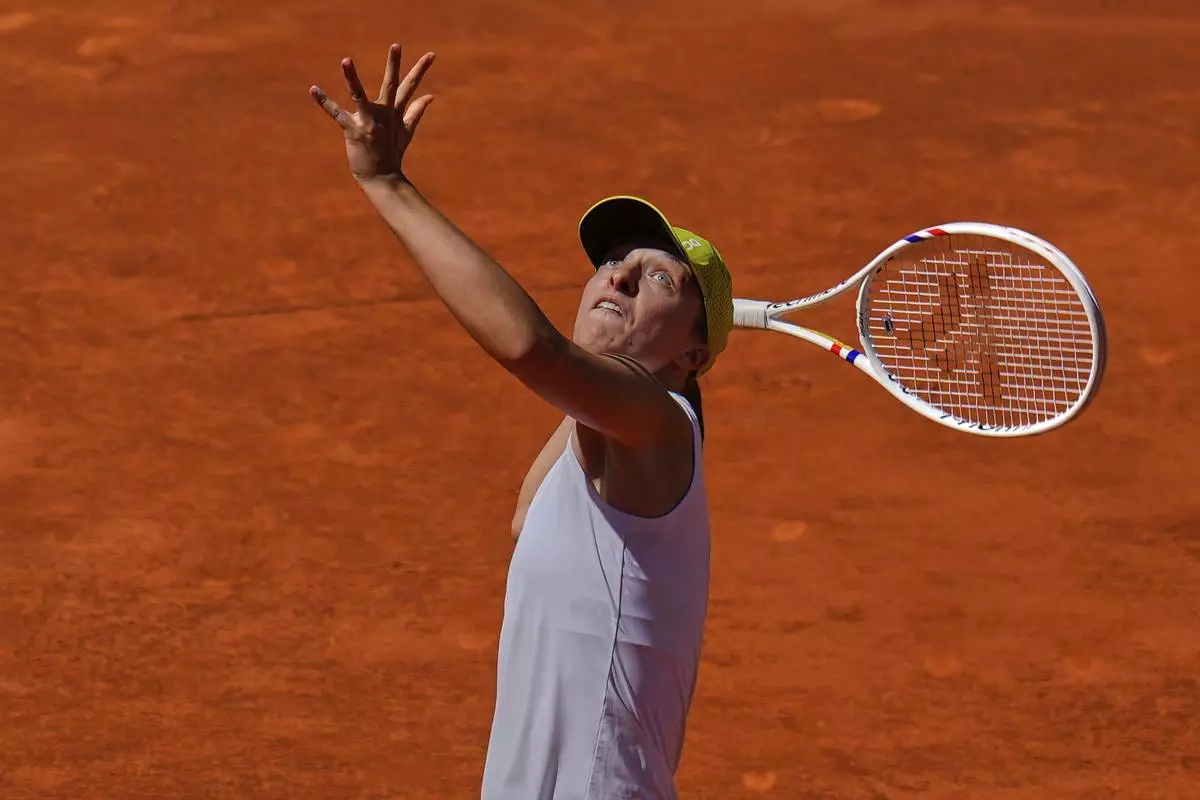
Poland's Iga Swiatek competes against Alexandra Eala of Philippines during the Madrid Open tennis tournament in Madrid, Spain, Thursday, April 24, 2025. (AP Photo/Manu Fernandez)

Alexandra Eala of Philippines runs for a ball during her match against Poland's Iga Swiatek during the Madrid Open tennis tournament in Madrid, Spain, Thursday, April 24, 2025. (AP Photo/Manu Fernandez)

Poland's Iga Swiatek returns the ball against Alexandra Eala of Philippines during the Madrid Open tennis tournament in Madrid, Spain, Thursday, April 24, 2025. (AP Photo/Manu Fernandez)

Poland's Iga Swiatek serves against Alexandra Eala of Philippines during the Madrid Open tennis tournament in Madrid, Spain, Thursday, April 24, 2025. (AP Photo/Manu Fernandez)

Poland's Iga Swiatek returns the ball against Alexandra Eala of Philippines during the Madrid Open tennis tournament in Madrid, Spain, Thursday, April 24, 2025. (AP Photo/Manu Fernandez)
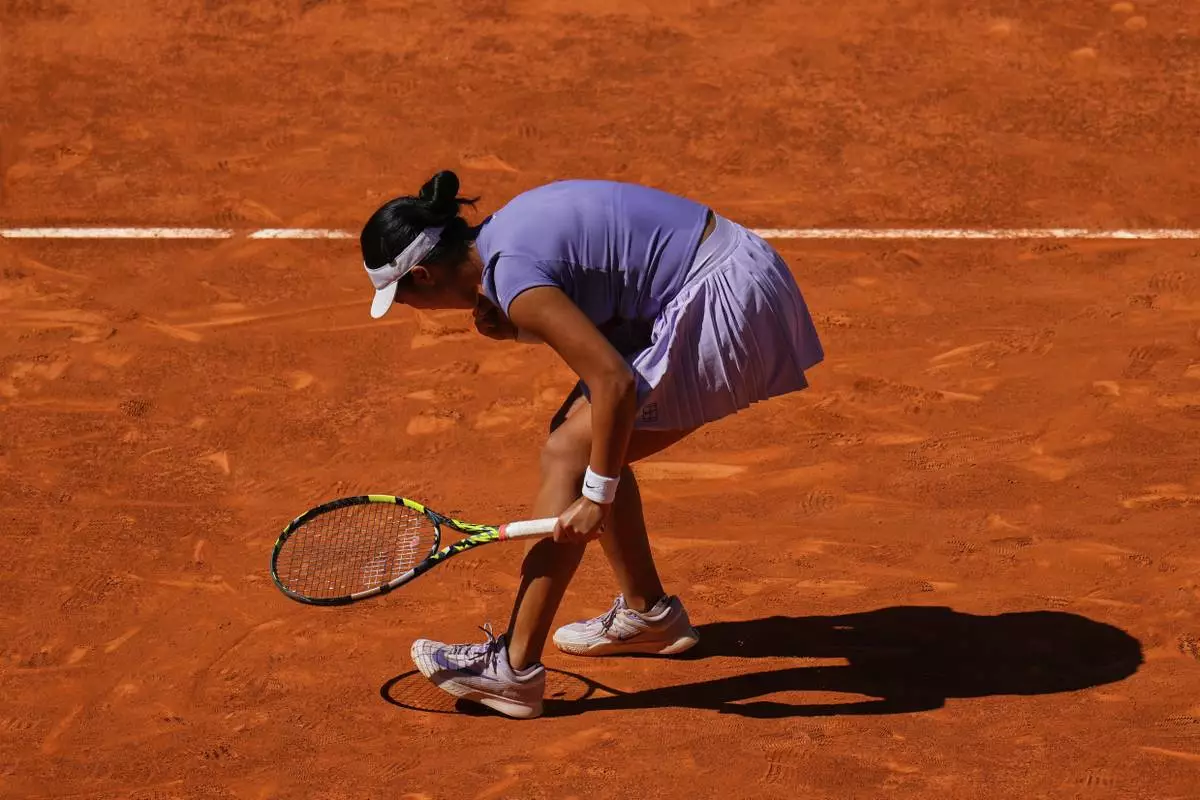
Alexandra Eala of the Philippines celebrates a point during her match against Poland's Iga Swiatek during the Madrid Open tennis tournament in Madrid, Spain, Thursday, April 24, 2025. (AP Photo/Manu Fernandez)

Alexandra Eala of Philippines returns the ball during her match against Poland's Iga Swiatek during the Madrid Open tennis tournament in Madrid, Spain, Thursday, April 24, 2025. (AP Photo/Manu Fernandez)

Poland's Iga Swiatek serves against Alexandra Eala of Philippines during the Madrid Open tennis tournament in Madrid, Spain, Thursday, April 24, 2025. (AP Photo/Manu Fernandez)
MEXICO CITY (AP) — All of a sudden, women contacting one of the biggest sources of information about abortion in Mexico through the encrypted messaging app WhatsApp were met with silence.
The nongovernmental organization’s business account had been blocked. Weeks later, a similar digital blackout struck a collective in Colombia.
Across the Americas, organizations that guide women seeking abortions in various countries are raising alarm, decrying what they see as a new wave of censorship on platforms owned by tech giant Meta — even in countries where abortion is decriminalized. The organizations believe this is due to a combination of changes to Meta policies and attacks by anti-abortion groups that denounce their content.
While this also occurs on Instagram and Facebook, the blocking of organizations’ verified WhatsApp business accounts, which they use to communicate with people seeking help, has been particularly disruptive. These accounts are crucial for communicating with people seeking help, and their blockage has significantly complicated daily interactions between women and support providers.
Meta usually attributes its content blocking to policy violations, though it has acknowledged occasional mistakes. Since January, Meta changed the way it moderates content, now relying on user-generated notes “to allow more speech and reduce enforcement mistakes.” U.S. President Donald Trump has said the changes were “probably” made in response to his threats over what conservatives considered a liberal bias in fact-checking.
Among the organizations whose WhatsApp business accounts were suspended is the MSI Foundation (formerly Marie Stopes), part of a network working in Mexico for 25 years. Its account was suspended in February, and the Colombian group Oriéntame, or Guide Me, which has worked in women's health in Colombia for decades, was labeled by Instagram as “dangerous.”
While conservatives cheered the change in Meta moderation policies, organizations helping women who seek abortions say they often result in over-enforcement, likely driven by Artificial Intelligence, which disproportionately flags or removes their posts — obstacles that have increased since the start of the Trump administration.
“It is not always intentional censorship, but the outcome is still more censorship for us and our partners,” said Martha Dimitratou, cofounder of Repro Uncensored, an organization that monitors digital suppression of reproductive health content.
“From one day to the next they blocked communication between our users and women who need first-hand information” to address doubts or look for medical follow-up with MSI, said Araceli López-Nava, the organization’s Latin America director.
In the days after the suspension, appointments dropped 80%
López Nava said that MSI had previously faced issues with regular WhatsApp numbers, because it’s easy to file complaints. So, the organization thought it would be different with a business account, which gives them a platform to manage the thousands of messages they receive every month.
That wasn't the case. After an initial suspension, MSI's WhatsApp business account was permanently suspended two weeks later. The reason cited in Meta’s notification? “Sending spam.”
“The argument is that they’ve received complaints, but from whom?” López-Nava asked. She said the organization can’t be accused of sending spam because they only answer those who contact them and provide information in line with Mexican law. Abortion is decriminalized in Mexico at the federal level and in the majority of its 32 states.
“It looks like an orchestrated strategy to us,” López-Nava said. “And not necessarily by Meta."
Dimitratou, who is also digital strategist for Canada-based Women on Web and the U.S.-based Plan C, said cases of blocked content have increased since Trump’s election, not only in the U.S., but around the world, likely driven by anti-abortion groups.
Conservative or religious groups have a history of attempting to leverage technology companies to obstruct abortion supporters’ efforts, but the anonymity of app reporting prevents organizations from proving who is behind it.
That is why MSI and an ally NGO, Women’s Link Worldwide, have asked Meta to implement transparent mechanisms to be able to appeal the company’s decisions and to respect international human rights standards. They have not received a response.
A Meta spokesperson told The Associated Press that MSI's WhatsApp business account was blocked for valid reasons, saying that organizations receiving numerous negative comments receive warnings before suspension. Meta declined to provide details about the nature of the negative comments or comment on whether they could be coordinated by anti-abortion groups aiming to paralyze MSI.
The Instagram accounts of Women on Web United States and Women on Web Latin America were suspended right after the U.S. presidential election in November, though they were later reinstated. Dimitratou said that Meta has also limited the organization’s ability to place ads on accounts in Latin America, South Korea and West Africa.
Repro Uncensored has documented at least 60 instances of similar digital censorship since January. The most recent occurred this week, when Thailand's TamTang Group said that Facebook had accused them of violating rules on selling medicines simply for sharing information about free abortion pills provided by the Thai government.
A 2025 report by the California-based Center for Intimacy Justice, based on a survey of 159 nonprofits worldwide, found that major tech platforms were removing ads and content related to abortion and other women’s sexual and reproductive health issues like menopause.
When asked about the report, Meta downplayed its findings, noting that it was based on a small number of examples.
Tech companies often cite policies against explicit or inappropriate sexual content or the advertisement of unsafe substances, such as abortion pills, even though the World Health Organization has said they’re safe.
In April, months after Meta announced changes to ensure greater freedom of expression, Oriéntame, the Colombian collective that offers reproductive health services, posted on Instagram a drawing of a heart and the phrase “Abort without pain.” The post was blocked with the explanation: “Dangerous people and organizations, photo removed.”
While Colombia legalized abortion in 2022, Oriéntame experienced censorship of at least 14 of their posts on Instagram in April 2025. That same month, their WhatsApp business account was suspended, said Tatiana Martínez, who manages their social media. Although the WhatsApp account was restored after a week, they worry it could happen again.
A Meta spokesperson said this week that the Instagram posts were mistakenly taken down and not the result of a change in its content standards.
Oriéntame director María Vivas says the organization has been battling Google for years over online content limitations. The tech giant said in a message to the AP that it only restricts content when it violates policies. But Google keeps Colombia on the list of countries with restrictions on abortion ads — even though abortion was decriminalized there in 2022.
As for their problems with Meta, Vivas said they started in late 2024, when the company started to change some of its internal policies.
Taking legal action against tech giants, when each country has its own laws, is complicated. As a result, affected organizations have turned to creative strategies, like operating multiple backup accounts, having a substitute ready when one is blocked and reformulating language in posts to avoid censorship triggers.
“It feels like Meta is our boss,” Vivas joked about the ongoing struggle with the tech giant over the basic right to provide health information. “We live to respond to Meta, to adapt ourselves to Meta,” she said. “That's absurd.”
AP journalist Maria Cheng contributed to this report from New York.
Follow AP’s coverage of Latin America and the Caribbean at https://apnews.com/hub/latin-america
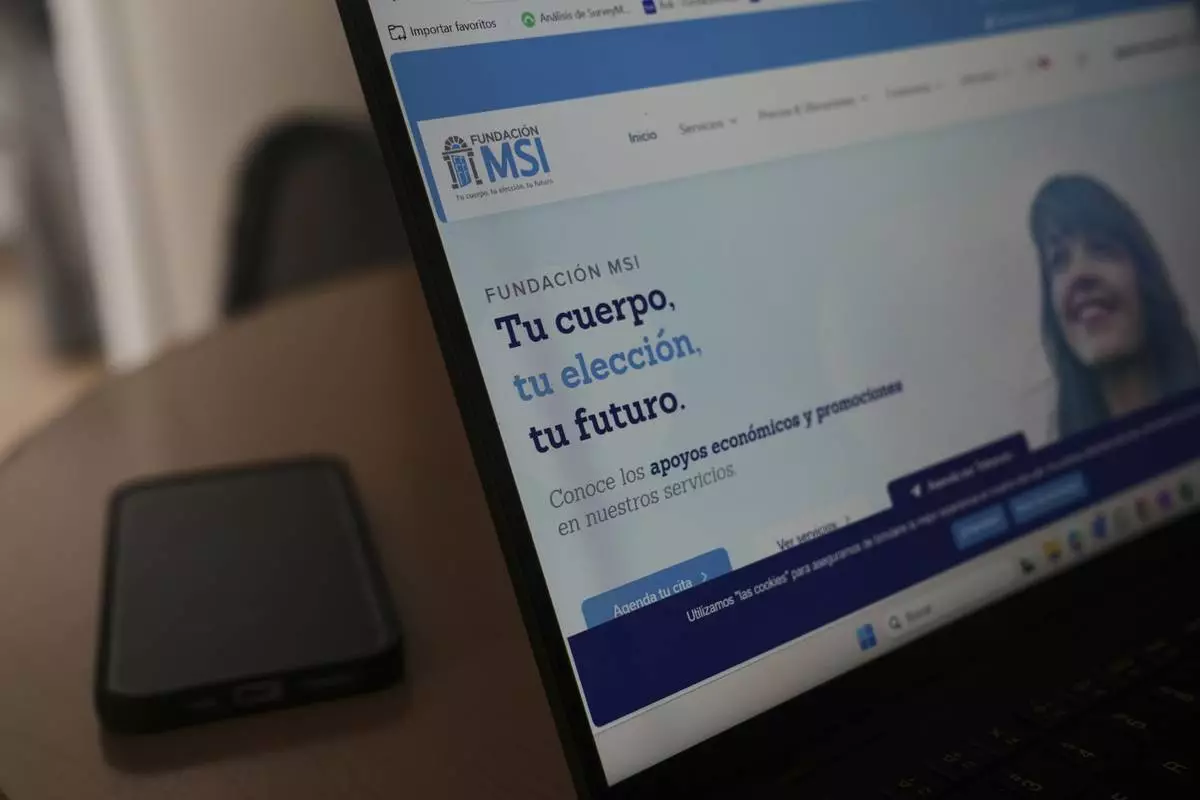
A computer monitor shows the splash page of the MSI Foundation website with a message that reads in Spanish: "Your body, your choice, your future", during a tour of the foundation, a non-governmental agency that offers information and help to women seeking abortions, in Mexico City, Thursday, May 8, 2025. (AP Photo/Marco Ugarte)
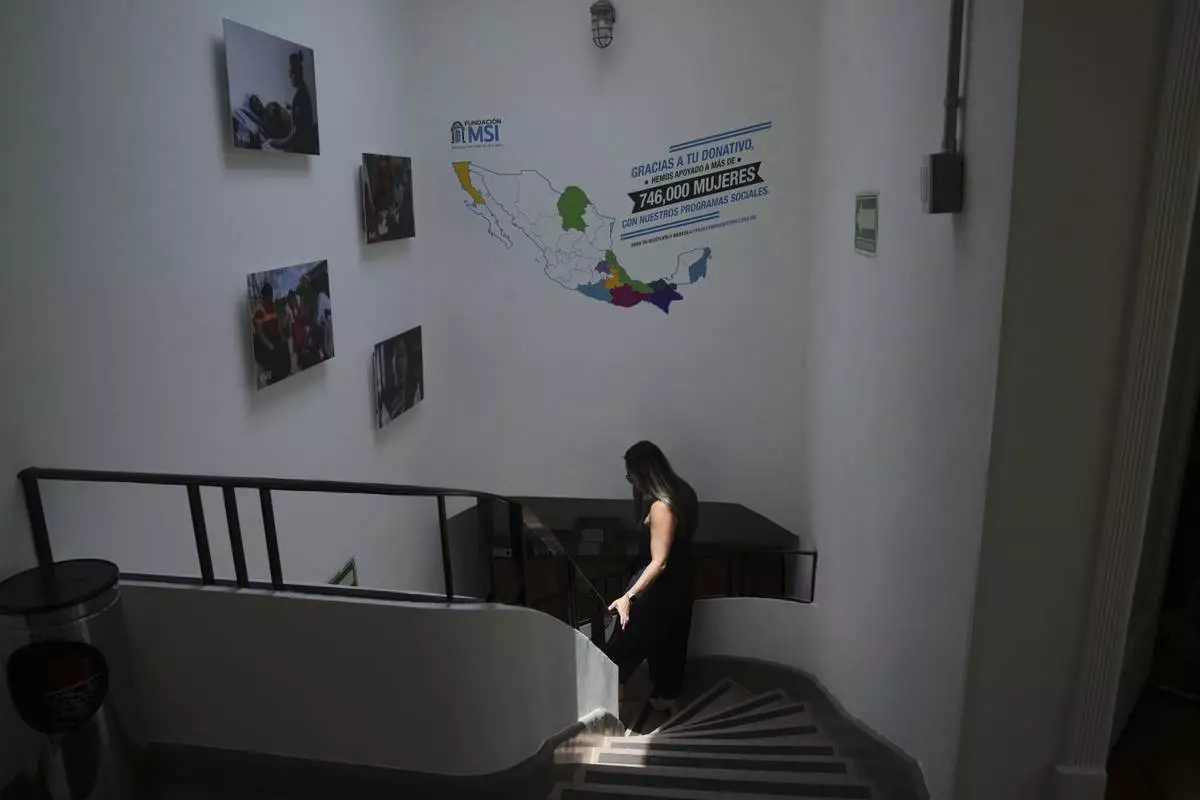
A health worker gives a tour of the MSI Foundation, an organization that offers information and help to women seeking abortions, in Mexico City, Thursday, May 8, 2025. (AP Photo/Marco Ugarte)
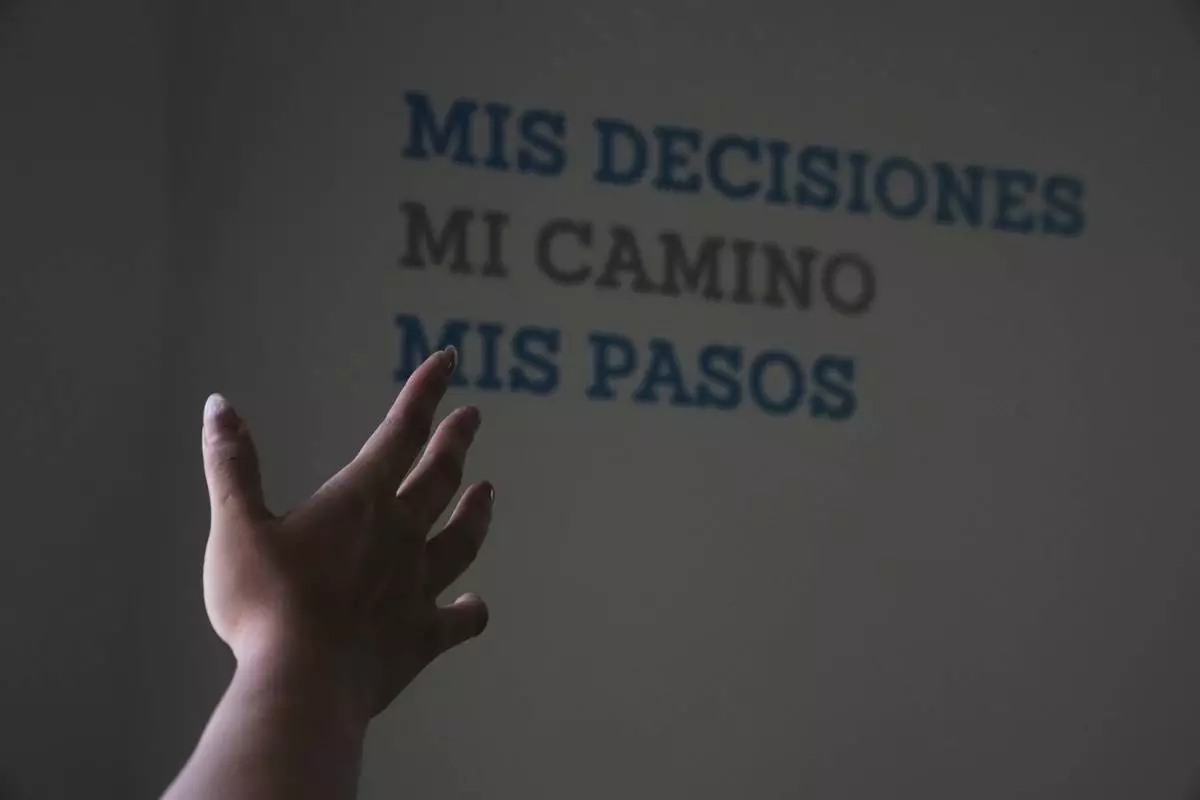
A health worker gestures towards a message that reads in Spanish; "My decisions, my road, my steps" during a tour of the MSI Foundation, an organization that offers information and help to women seeking abortions, in Mexico City, Thursday, May 8, 2025. (AP Photo/Marco Ugarte)
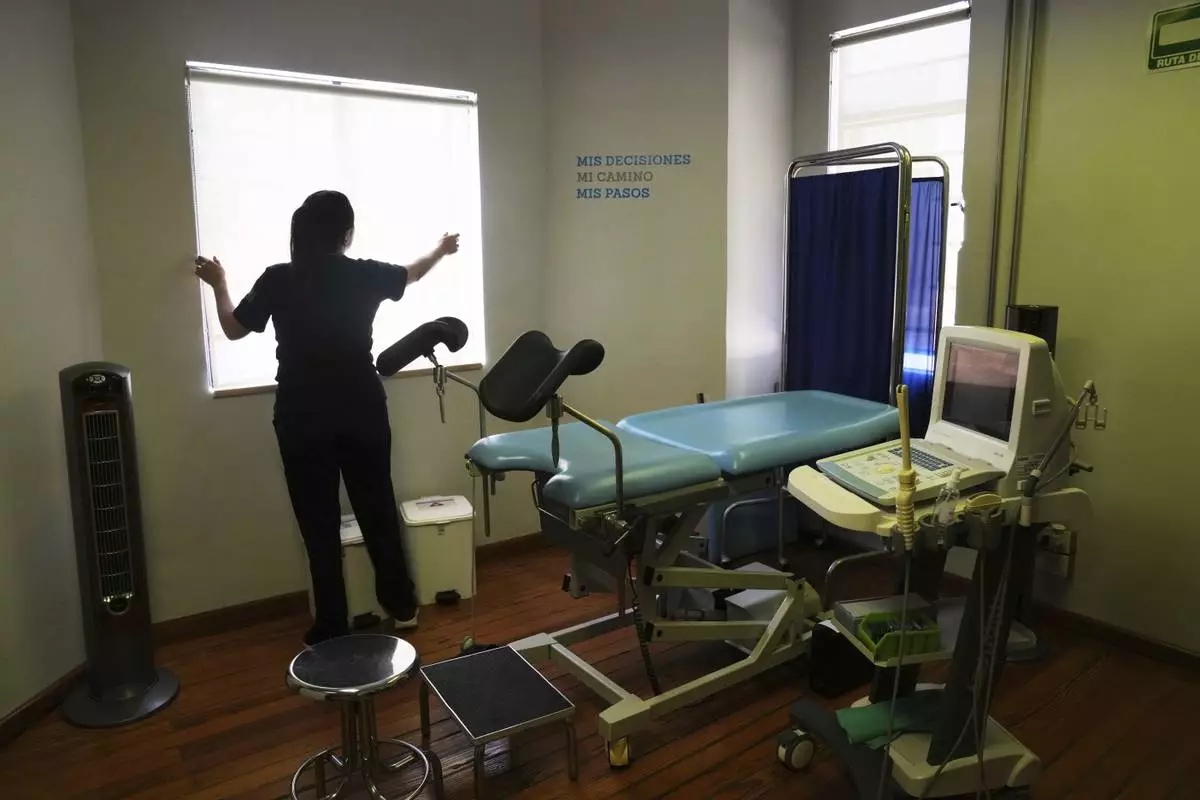
A health worker gives a tour of the MSI Foundation, an organization that offers information and help to women seeking abortions, in Mexico City, Thursday, May 8, 2025. (AP Photo/Marco Ugarte)































